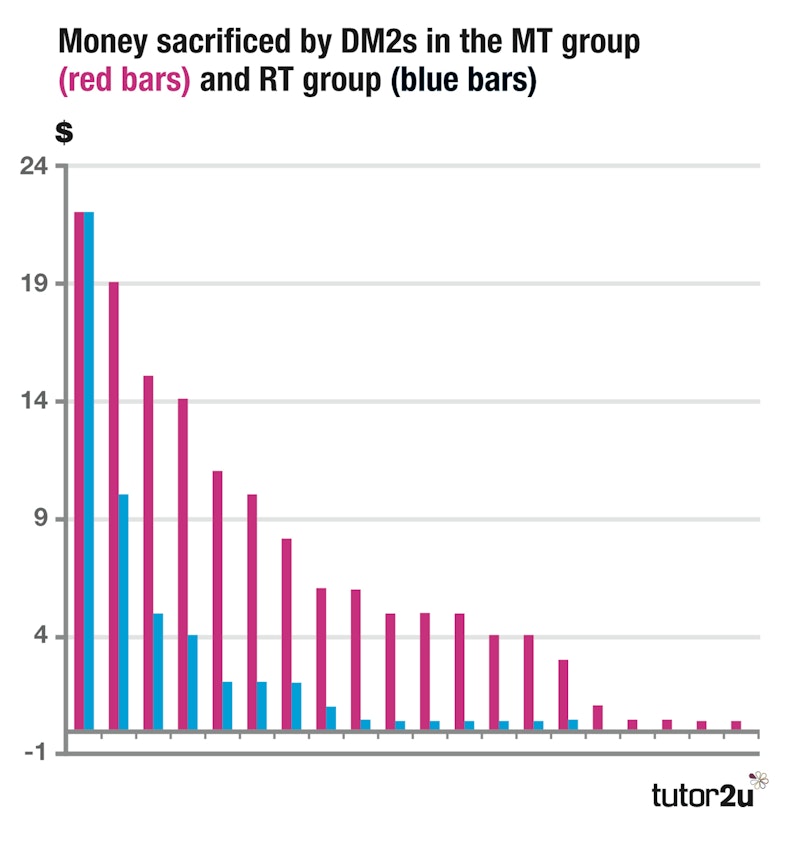Study Notes
Morhenn et al. (2008)
- Level:
- AS, A-Level, IB
- Board:
- AQA, Edexcel, OCR, IB, Eduqas, WJEC
Last updated 22 Mar 2021
Monetary sacrifice among strangers is mediated by endogenous oxytocin release after physical contact.
Background information: Humans touch each other, including strangers, a substantial amount. Types of touch include handshaking, caressing, kissing, and hugging. In a classic study, touch by waitresses was shown to increase tips even though service was not judged to be better relative to those who were not touched. Similarly, students checking out books at a library who were touched reported a more favourable view of service; this was especially true for women.
Oxytocin levels rise when individuals are intentionally shown trust via monetary transfers. Indeed, those with higher oxytocin levels show increased monetary sacrifice. Because repetitive stroking has been shown to induce oxytocin release in animals it was hypothesized that touch might be a mechanism connecting oxytocin to sacrifice.
Aim: To test the relationship between physical contact, oxytocin levels and sacrifice.
Method: 96 students (mean age 22.3 years) from University of California, Los Angeles (UCLA) participated in the study. Participants were randomly assigned to one of three groups: Massage and Trust (MT, n=42), Rest and Trust (RT, n=30), or Massage only (M, n=24). Females comprised 53% of the sample and were nearly equally balanced across groups M (54%), MT (51%) and RT (53%). Sessions had between 8 and 14 participants to ensure anonymity.
Participants in the M and MT groups received a 15-min moderate pressure massage of their backs from a massage therapist. Those in the RT group were asked to rest for 15 min in the same rooms used by the other subjects who received massages. RT and MT sessions were run on separate days so that RT subjects were unaware that other participants received massages.
The trust game involved random allocation into two groups, either as decision maker 1 (DM1) or decision maker 2 (DM2). After massage or rest, those in the MT and RT groups played one round of the trust game as either DM1 or DM2. All players were given $10 and each DM1 was paired, again randomly, with a DM2.
DM1 was prompted by computer to send a certain amount of his or her $10 to the DM2 in his pair. Whatever was sent was subtracted from DM1's account and tripled in DM2's account. Subsequently, DM2 was informed by computer of the tripled transfer he or she received and the total in his/her account and then was prompted to sacrifice some amount by making a return transfer to DM1. What DM2 sends to DM1 is not tripled and is removed from DM2's account. The DM1 to DM2 transfer is considered a signal of trust, and the DM2 to DM1 transfer was measured as the amount sacrificed.
Blood samples were taken before and after the experiment, and the ending oxytocin levels compared with the participant’s basal levels taken at the beginning.

Results: There was no change in oxytocin in the M group who received massages but did not play the trust game. Oxytocin increased among subjects who received massages and played the trust game, but fell among subjects who rested for 15 minutes and then played the game.
Touch significantly elevated circulating oxytocin levels but only when it was followed by an intentional act of trust. The rise in oxytocin was 16% higher among MT DM2s compared to RT DM2s, even though both received statistically identical signals of trust. Touch followed by trust increased monetary sacrifice by 243% relative to untouched controls. Women were more susceptible than men to oxytocin release and monetary sacrifice after touch.
The average amount received by DM2s (MT and RT) was $17.36. While the average monetary sacrifice in the RT group was $2, the average sacrifice in the MT group was $6.85, and this difference was predicted by these DM2s' increase in oxytocin. There was no difference in behaviour or oxytocin activity between DM1s in the MT and RT groups.
Conclusion: The massage not only increased sacrifice of money, but the amount of sacrifice was predicted by the change in oxytocin, with touch increasing the oxytocin of women more than that of men, and their money sacrificed being higher.
Evaluation:
Strengths of the study: Comparing levels of oxytocin with individual basal levels removes the difficulty of determining what is a normal amount of oxytocin for humans.
The sample was a mixture of males and females and this was a well-controlled experiment. The account taken of the stress caused by blood taking, the phase that women were in their monthly cycle, and the control of a massage only group all meant that the researchers were able to suggest that it was the combination of touch and gratitude that raised the oxytocin level and resulted in monetary sacrifice.
Limitations of the study: The trust game is an artificial environment and we cannot be sure that the combination of touch and trust in real life would result in a raising of oxytocin levels and monetary sacrifice. It would be very difficult to test for this.
For More Study Notes…
To keep up-to-date with the tutor2u Psychology team, follow us on Twitter @tutor2uPsych, Facebook AQA / OCR / Edexcel / Student or subscribe to the Psychology Daily Digest and get new content delivered to your inbox!